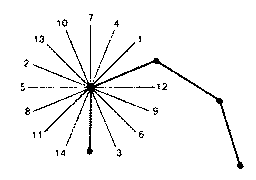 |
Science Frontiers ONLINE No. 66: Nov-Dec 1989 |
|
|
Army ants: a collective intelligence?
Put a hundred army ants on a flat surface and they will walk around in never decreasing circles until they die from exhaustion. But a colony of a million army ants is a sophisticated "super-organism." The colony carries out its legendary raids and can even keep nest temperatures constant to within a degree. An army ant colony seems en dowed with an intelligence far beyond that of any individual ant. N.R.Franks speculates thus:
"It seems that intelligence, natural or artificial, is an emergent property of collective communication. Human con-sciousness itself may be an epiphenomenon of extraordinary processing power. Although experts prefer to avoid simplistic definitions of intelligence, it seems clear that all intelligence involves the rational manipulation of symbolic information. This is exactly what happens when army ants pass information from individual to individual through the 'writing' and 'reading' of symbols, often in the form of chemical messengers or trail pheromones, which act as stimuli for changing behavior patterns."
 During its 20-day stationary phase, an army ant colony scatters about 14 foraging raids directed 123� apart. The heavy line indicates the colony's path during the nomadic phase. |
Perhaps more remarkable is the systematic orientation of the raids in the stationary phase. These raids are separated by an average 123�, as diagrammed. This scattering allows time for new prey to enter the previously raided areas.
But how does the colony determine direction in the dense rain forest? Probably from polarized sinlight, thinks Franks. But here we have a problem: each army ant, instead of having multi faceted compound eyes like most insects, has just a single facet in each eye.
"The mystery is how the colony can navigate with each of its workers having such rudimentary eyesight. In my wildest dreams, I imagine that the whole swarm behaves like a huge compound eye, with each of the ants in the swarm front contributing two lenses to a 10- or 20-m wide 'eye' with hundreds of thousands of facets."
(Franks, Nigel R.; "Army Ants: A Collective Intelligence," American Scientist, 77:139, 1989.)
Comment. By analogy, the human body is a colony of individual cells, most of which are specialized in some way. Individual human cells can be grown alone, but they are as directionless as the 100 ants on the flat surface.